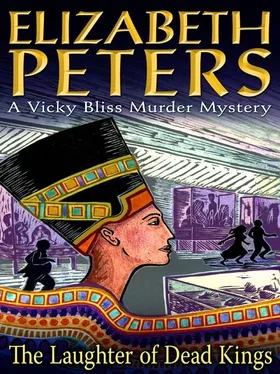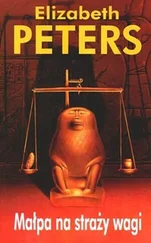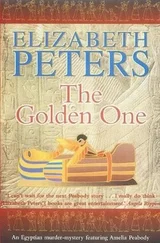TWELVE
Saida made it to the bathroom in time. Swallowing strenuously I followed her and sat on the edge of the tub until she was through.
“I’m sorry,” she gasped, raising a pale face.
“It’s okay.” I offered a glass of water and a handful of tissues. “You’re blasé about mummies; I’m not. But I expect I’m more accustomed to fresh corpses than you are.”
She got unsteadily to her feet and took the glass. “Vicky. Was it…It wasn’t his?”
“No.” I hadn’t thought it was, not even for an instant; I knew those long, elegantly shaped hands too well. The very idea that it might have been made my stomach churn. I went on, deliberately matter-of-fact, “It was a woman’s hand. Small, brown, traces of henna on the nails and skin.”
“I’m all right now.” She squared her slim shoulders. “We must look again. Try to determine who it was.”
I had a pretty good idea of who it was.
Feisal had turned away from the exhibit and lit a cigarette. Schmidt was still peering down into the box.
“It is the hand of a woman,” he said.
“An Egyptian woman.” I joined him and forced myself to have another look. “She was already dead when they cut it off. There’s very little blood.”
Saida let out a long shuddering sigh. Feisal put an arm around her shoulders. “The woman Ashraf met last night,” he said, and blew out smoke in a long exhalation.
“It’s a reasonable guess.” I was sorry I’d quit smoking. Then I remembered I had another bad habit. I went to the minibar and selected two small bottles more or less at random. At that point I didn’t care what I drank so long as it was alcoholic.
Schmidt took the glass I handed him. “ Vielen Dank, Vicky. Are you all right?”
“As right as one can be under the circumstances.” Scotch jolted down into my queasy interior, which welcomed it heartily. “What are we going to do with—with it?”
“Notify the police, of course,” Feisal said.
Schmidt carefully lowered the lid of the box. “Not of course, my friend. Not until we have had time to consider this. There was a message.”
The slip of paper in his hand must have been under the horrible thing. It certainly hadn’t been on top of it. Bless the old dear, he had more guts than any of us. Bushy brows raised, he held it out. When no one offered to take it, he read it aloud.
“‘You are responsible for her death. The price is now four million. You have three days.’ Well, Feisal? Do you want to show this to the police? Even if we do not hand over the note they will want to know why the box was sent to us.”
Feisal ran a hand through his hair. “What do you suggest?”
“Ashraf,” I said.
At first Feisal resisted the idea of calling his boss. “He’ll only make matters worse. This would never have happened if he hadn’t tried to be clever.”
“Exactly,” I said. “It’s his mess, and I vote we shove it in his face.”
“So do I,” Saida said. “Schmidt? Yes. You are outvoted, Feisal.”
Ashraf answered on the first ring. Feisal was uninformative but peremptory. “No, I can’t tell you what the problem is, but it’s bad. Just get over here, right now.”
Then we waited. He was there sooner than I had expected. He had to be pretty worried to respond so quickly, but, being Ashraf, he wasn’t about to admit it.
“I was on my way to an appointment,” he said stiffly. He was dressed to the nines, a monogrammed hankie tucked in his breast pocket, which bore the insignia of a Cairo sporting club. “What is so—”
The sentence ended in a hiss of breath. I had cleared everything off the table except for the box, and was standing in front of it. I stepped to one side with a graceful wave of my hand; there it was, conspicuous as a signboard even to one who had not seen the first delivery. I felt a little guilty when I saw the blood drain from Ashraf’s face. But only a little. He was afraid it was another piece of his precious mummy.
I felt even less guilty when his reaction to the reality was visible relief. “I thought,” he began, and then turned on Feisal. “Did you arrange this charade? I know you dislike me, Feisal, but to torture me in this way—”
“It’s not a charade,” I said furiously. “And it’s not a damned dried-up mummy that’s been dead for three thousand years. Sit down and shut up, Ashraf. Give him the note, Schmidt.”
I gave him two seconds to read it and then said, “This was meant for you, Ashraf. It was safer for them to deliver it here rather than approach you directly, after the dumb stunt you pulled last night. What are you going to do about it?”
“Four million,” Ashraf mumbled, staring at the paper.
“Can you raise that much?”
“Not in three days. Not without stripping myself of every asset I own.”
“Then it seems to me your only recourse is to inform the Ministry.”
Ashraf let out a bleat of protest. “What other option have you?” I went on remorselessly. “Leave it to them to decide whether to raise the money or risk the negative publicity. If I were in their shoes I’d choose the latter alternative. The gang may take the money and not return your precious Tut. For all you know, he’s already been destroyed.”
Ashraf drew a long breath. He tossed the note onto the table. “There is another option,” he said. “We must locate these villains before the deadline.”
“Any ideas?” I inquired sarcastically.
“Keep looking. We have three days. I have the authority to request police assistance. I will tell them we are searching for a missing tourist who may have been kidnapped.”
“It’s worth trying,” Feisal said. “Schmidt, you questioned the concierge. Did he give you a description of the man who delivered the parcel?”
“Only that he was a neatly dressed man who said he was a clerk at the store in question. The lady had wanted an object which was not in stock, and they promised to procure it for her and deliver it to the hotel. They had a card with her name on it.”
“My name,” I added helpfully.
Eyeing Ashraf closely, Schmidt added, “We discussed whether or not to notify the police, and concluded it was only fair to consult you first, since you were the last known person to see her alive.”
Ashraf’s jaw dropped. “What are you implying?”
“I state a fact,” Schmidt said. “Which in duty bound I will feel obliged to mention to the police. You are the only one of us who can give them a description of the woman.”
You had to admire Ashraf’s nerve. Schmidt’s one-two punch had shaken him badly, but he wasn’t stupid enough to start spouting denials. We gave him time to think it over. After a long interval he straightened and looked up at Schmidt.
“Very well, Herr Doktor, the police must be kept out of this for the time being.”
“That,” said Schmidt, “is your opinion. We have invited it but the final decision is mine—ours, I should say.”
He could have the first person singular, as far as I was concerned. So far he had played it brilliantly. John couldn’t have done better.
“You do not deny,” Schmidt went on, “that the severed member most probably belonged to the woman you met at Karnak?”
“Don’t interrogate me as if I were a suspect,” Ashraf said with a flash of temper. “I don’t deny it is possible—likely, even. However, I bear no responsibility for her death. I don’t know who she was or where she went. I was struck unconscious, remember? You had better question the man who hit me.”
“It wasn’t John,” I snapped.
“You would say that, of course,” Ashraf said, giving me a sympathetic look.
I saw the same look on a couple of other faces, and lost the remains of my temper.
Читать дальше








